Prose vs Pictures #4 | Irvine Welsh's Filth vs Jon S Baird's Filth

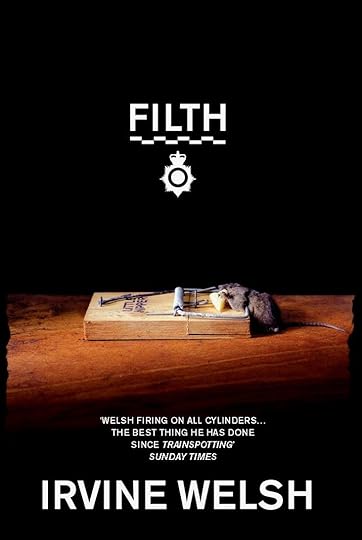 I’ve always loved Filth. Who doesn’t? The first of Irvine Welsh’s novels to move away from the minds of downtrodden yet blazingly vibrant schemies, Filth holds a mirror up to an aspirant middle class professional - and the reflection cast back is every bit as uncomfortable as the images of addiction and squalor conjured by his seminal Trainspotting. It’s not so much a different playing field that we’re looking at here as it is the opposing team. Fundamentally though, the same rules apply.
I’ve always loved Filth. Who doesn’t? The first of Irvine Welsh’s novels to move away from the minds of downtrodden yet blazingly vibrant schemies, Filth holds a mirror up to an aspirant middle class professional - and the reflection cast back is every bit as uncomfortable as the images of addiction and squalor conjured by his seminal Trainspotting. It’s not so much a different playing field that we’re looking at here as it is the opposing team. Fundamentally though, the same rules apply.Filth is the tale of a misogynistic, callous and cruel detective sergeant who’s got his sights set on an inspectorship, and whose department’s investigation into a high-profile murder offers him the perfect means by which to seize it - provided, of course, that he can destroy everyone else in the frame for the post through his exploitative “games”. A thickly-sliced sausage of cognitive dissonance wrapped in the sizzling bacon of a darkly comic police procedural, Welsh recently described the novel as the tale of “...someone who isn’t taking their pills who should be,” and its appeal lies as much in that as it does its dramas of murder and manipulation. Indeed, what really sells the book is the unique manner of its telling, which is entirely in the idiosyncratic voices of Detective Inspector Bruce Robertson. That’s right my sweet, sweet friend: plural.
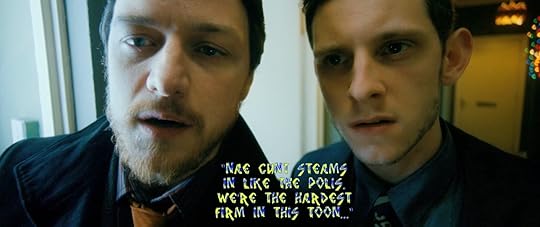 There are many aspects to Bruce, some of which he’s aware of, others that he’s perhaps not. At one end of the scale he’s a fantasist, turning ‘I’ into ‘we’ in a half-cognisant attempt to soften a loss that he can’t bear. At the other, he’s being consumed from the inside-out by the implied distillation of all his rottenness and evil: the Self, a surprisingly chatty tapeworm who, it seems, is privy to all his thoughts and secrets, the “ghosts” of which haunt his overfed innards.
There are many aspects to Bruce, some of which he’s aware of, others that he’s perhaps not. At one end of the scale he’s a fantasist, turning ‘I’ into ‘we’ in a half-cognisant attempt to soften a loss that he can’t bear. At the other, he’s being consumed from the inside-out by the implied distillation of all his rottenness and evil: the Self, a surprisingly chatty tapeworm who, it seems, is privy to all his thoughts and secrets, the “ghosts” of which haunt his overfed innards.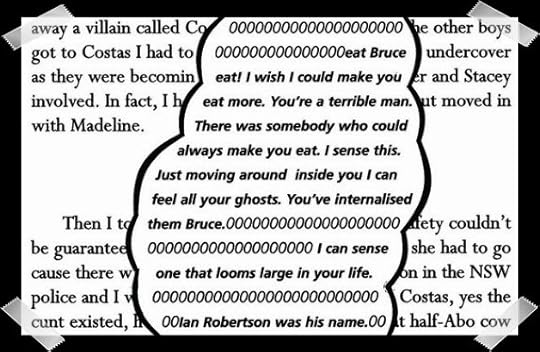 As was already evident from his preceding wors, most notably Marabou Stork Nightmares, Welsh has a flair for creative typography, and it reaches its apotheosis in Filth. Bruce’s principal voices are often displayed concurrently on the page - Bruce the cop’s musings are set out in Welsh’s well-established vernacular Scots prose, while the tale of his tapeworm is set above it in an illustrated, meandering stream that crudely resembles a digestive tract. The Self’s increasingly coherent, and eventually expositional, words obscure most of the prose whenever they appear, serving as a wonderful metaphor for the all-pervading effects of Bruce’s psychological schisms on his day-to-day life. It’s bold and revolutionary stuff - though admittedly a bit irritating if, like me, you want to know everything and it annoys the hell out if you that you’re missing out on what’s going on underneath. Welsh is, of course, careful not to overwrite anything significant, but it’s nonetheless a testament to Bruce’s compelling narration that even the covering of its most banal passages irks me.
As was already evident from his preceding wors, most notably Marabou Stork Nightmares, Welsh has a flair for creative typography, and it reaches its apotheosis in Filth. Bruce’s principal voices are often displayed concurrently on the page - Bruce the cop’s musings are set out in Welsh’s well-established vernacular Scots prose, while the tale of his tapeworm is set above it in an illustrated, meandering stream that crudely resembles a digestive tract. The Self’s increasingly coherent, and eventually expositional, words obscure most of the prose whenever they appear, serving as a wonderful metaphor for the all-pervading effects of Bruce’s psychological schisms on his day-to-day life. It’s bold and revolutionary stuff - though admittedly a bit irritating if, like me, you want to know everything and it annoys the hell out if you that you’re missing out on what’s going on underneath. Welsh is, of course, careful not to overwrite anything significant, but it’s nonetheless a testament to Bruce’s compelling narration that even the covering of its most banal passages irks me.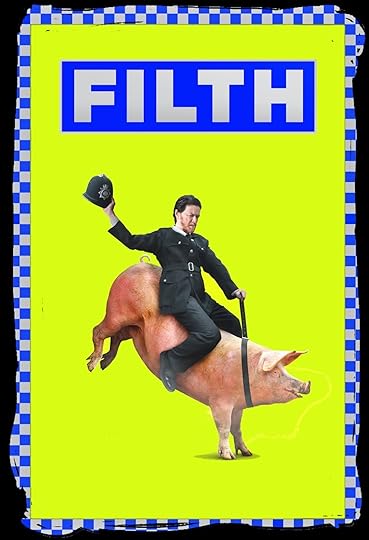 Given the above, it’s easy to see why it took so long for Filth to appear on the silver screen despite numerous production companies acquiring the rights over the years. Some stories are so dependent on the freedoms and limitations of the printed word that to take them into a different medium would be at best laden with difficulty, and at worst self-defeating, but inventive cult classics such as Fight Club have proven that it can be done successfully with a little creative licence. Thus the Filth that was released theatrically last year is necessarily a very different sort of muck to the infamously porcine polis-faced tome that first saw print in 1998. In adapting the novel, director and screenwriter Jon S Baird has stripped the story right back to its core, tearing away its defining literary gimmicks and substituting them with more subtle cinematic ones. The logistical problems inherent in presenting the musings of Carole, Bruce’s absent wife, are tackled by initially presenting her as a dreamlike figure who seems to exist within the confines of a perfume commercial, eventually segueing through song into her tragic and true form, which ironically is even more surreal. The worms, meanwhile, join the many nightmarish ghouls in Dr Rossi’s treating rooms as Baird turns to a wacky Jim Broadbent to capture the spirit of the novel’s underpinning, if not quite the substance. It’s an intense yet economic approach that I think strikes the perfect balance for the viewer, conveying the same sense of madness as the book but without the same level of intrusion.
Given the above, it’s easy to see why it took so long for Filth to appear on the silver screen despite numerous production companies acquiring the rights over the years. Some stories are so dependent on the freedoms and limitations of the printed word that to take them into a different medium would be at best laden with difficulty, and at worst self-defeating, but inventive cult classics such as Fight Club have proven that it can be done successfully with a little creative licence. Thus the Filth that was released theatrically last year is necessarily a very different sort of muck to the infamously porcine polis-faced tome that first saw print in 1998. In adapting the novel, director and screenwriter Jon S Baird has stripped the story right back to its core, tearing away its defining literary gimmicks and substituting them with more subtle cinematic ones. The logistical problems inherent in presenting the musings of Carole, Bruce’s absent wife, are tackled by initially presenting her as a dreamlike figure who seems to exist within the confines of a perfume commercial, eventually segueing through song into her tragic and true form, which ironically is even more surreal. The worms, meanwhile, join the many nightmarish ghouls in Dr Rossi’s treating rooms as Baird turns to a wacky Jim Broadbent to capture the spirit of the novel’s underpinning, if not quite the substance. It’s an intense yet economic approach that I think strikes the perfect balance for the viewer, conveying the same sense of madness as the book but without the same level of intrusion. The film also does a tremendous job of homing in on the story’s key points and giving life to them almost exactly as readers would have imagined them. There’s barely a cut that’s loss is felt keenly - the only prominent examples that I can think of are a hilarious set piece en route to the Dam (Hamburg in the movie), in which Bruce seeks retribution against a do-gooder who’s publicly pulled him up on his lewd manner, and Bruce’s ill-fated visit to Hector’s house, where his plans to shoot Animal Farm II are put paid to when Hector’s “queer dug” fancies Bruce more than his intended co-star. Even these, though, were scripted and shot, as I found out to my delight when devouring the Blu-ray’s archive of deleted scenes (Welsh’s customary cameo amongst them). Nevertheless, as with most adaptations, the sense of total immersion that great novels engender is lessened by the obligatory omissions, as even in trimming the narrative fat, Baird has inevitably made Bruce’s world a little smaller.
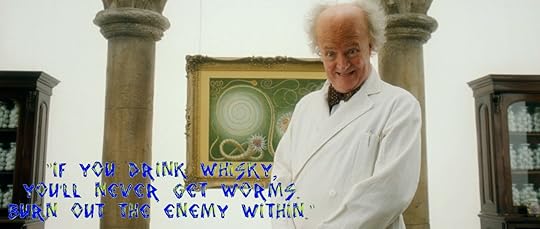
You’ll note a qualifying “almost” in the paragraph above, and it’s an important one. The on-screen Filth is replete with superficial deviations from the text that don’t really alter the essence of the story (the murder victim’s ethnicity, the substitution of Hamburg for Amsterdam, the amalgamation of Drummond and “Chinky-drawers”, the shocking absence of Lennox’s Zapata ’tache), and a few that do. Of the latter, one is a huge revision to the murder plot that I won’t spoil, and the other is the almost complete veiling of Bruce’s back story, which in the book is outlined in the tapeworm’s concluding monologue, but on film is only flirted with in visions and through spectres. I think that this works to the story’s advantage though, as the ghosts of Bruce’s past are more effective challenging the viewers’ imaginations than they are providing readers with mitigating circumstances, if not outright excuses, for his dramatic fall from grace.
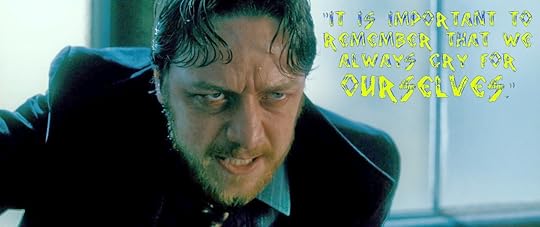
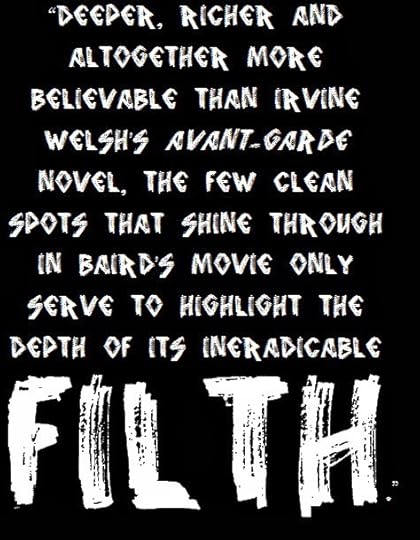 The most obvious departure, however, is the look of Bruce himself, who in print comes across as a rough and weather-beaten forty-something veteran of the force and the craft - a far cry from the usually soft-skinned pin-up who’d be cast to play him. The casting would prove to be inspired, however, as an alcohol and junk food-fuelled McAvoy would give life to an interpretation of Bruce every bit as weathered and vile as his literary counterpart, but defined by a vulnerable edge that really makes the viewer care about his plight. On screen, the beating black heart of the story is tempered by a devastating sympathy for the devil that McAvoy’s powerful performance and the screenplay’s redacted finale conspire to stimulate.
The most obvious departure, however, is the look of Bruce himself, who in print comes across as a rough and weather-beaten forty-something veteran of the force and the craft - a far cry from the usually soft-skinned pin-up who’d be cast to play him. The casting would prove to be inspired, however, as an alcohol and junk food-fuelled McAvoy would give life to an interpretation of Bruce every bit as weathered and vile as his literary counterpart, but defined by a vulnerable edge that really makes the viewer care about his plight. On screen, the beating black heart of the story is tempered by a devastating sympathy for the devil that McAvoy’s powerful performance and the screenplay’s redacted finale conspire to stimulate. Now I’m normally the first to criticise a film’s departure from an established narrative, particularly if it significantly alters one’s perception of the piece, but with Filth, I have to concede that the movie’s more lenient climax is ultimately even more harrowing than the book’s, which even when reading for the first time seemed to stretch credibility just a little too far, and moreover failed to evoke the same measure of sympathy for the protagonist (who’s arguably an antagonist in print). On the page, Bruce is driven almost entirely by hate and self-interest and his dark deeds are almost implausibly extreme; he’s arguably closer to evil than even the animalistic Franco Begbie, whose gross stupidity robs him of the requisite mens rea half the time. On screen, however, Bruce is compelling and vile but with a morsel of decency that starts to visibly grow as the noose looms. He makes you care, slowly but surely.

A lot of the credit for this is also owed to the performance of Eddie Marson, who plays Bruce’s masonic cohort and loser of a best friend, Clifford Blades. Boring, bumbling and utterly free from malice, Brother Blades is the perfect foil to the bullying Bruce. Whilst Baird’s screenplay adds little to the relationship as originally depicted by Welsh, in retaining almost every aspect of it at the expense of other narrative threads, not to mention adding one or two defining flourishes, the movie really seems to drill down into it, enriching the story and giving McAvoy and Marson the ammunition that they need to break viewers’ hearts.
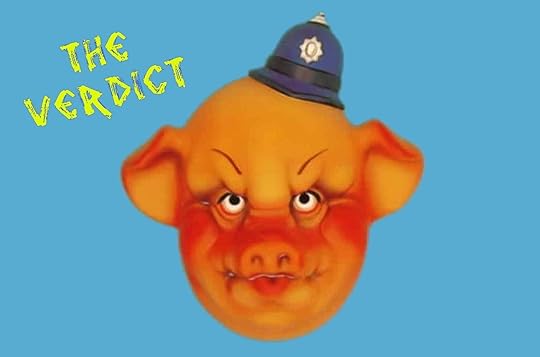
After going 3-0 down, Pictures have clawed one back with a movie that, to my astonishment and pleasure, actually manages to improve upon an already seminal work of fiction. Deeper, richer and altogether more believable than Irvine Welsh’s avant-garde novel, the few clean spots that shine through in Baird’s movie only serve to highlight the depth of its ineradicable filth.
Irvine Welsh’s Filth novel is currently available in paperback (best price online today: £3.40 from AbeBooks including delivery) and digital formats (£3.66 from Amazon’s Kindle Store or £4.99 from iTunes).
Jon S Baird’s Filth movie is available to download from iTunes in 1080p HD for £13.99. The Blu-ray edition, which also offers a vast selection of deleted scenes and interviews, is currently cheapest at Asda where it is being sold for £13.00 with free delivery.
Published on March 21, 2014 06:50
No comments have been added yet.
E.G. Wolverson's Blog
- E.G. Wolverson's profile
- 52 followers
E.G. Wolverson isn't a Goodreads Author
(yet),
but they
do have a blog,
so here are some recent posts imported from
their feed.



